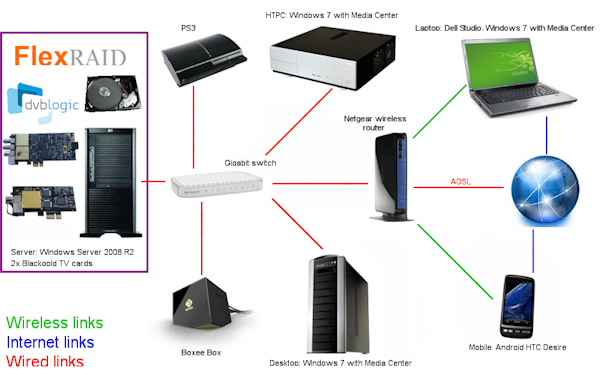آنے والے مہینوں میں میں نے ایک نئی جائیداد خریدنے جائے گا, اور اپنے نئے گھر کے ساتھ جانے کے لئے, میں نے ایک نئے گھر میڈیا سیٹ اپ ضم ہو سکتا ہے کہ کس طرح پر بہت سے اپ پڑھ رہا تھا. حالیہ مہینوں میں کئی دلچسپ نئے اختیارات دستیاب ہو گئے ہیں, which finally makes the sort of setup I have always desired a real possibility.Currently, میرے پاس 1 HTPC which lives under the lounge ٹی وی and contains a BlackGold twin freeview-HD tuner. Upstairs in the attic I have a Windows Server 2008 R2 server which contains a RAID card and approx 8Tb of storage. The HTPC is responsible for recording ٹی وی, whilst the server contains various media and document libraries. The server runs 24.7, wheras the HTPC sleeps unless we are watching or recording ٹی وی. We also have a bedroom ٹی وی with built-in freeview which isn’t connected to the media-network.
Whilst this system is fine, and has served me well for a number of years, I would like to find ways to also do the following
- Manage ٹی وی recordings from my android phone, or via the web.
- Store the recorded ٹی وی on the server automatically, rather than on the HTPC.
- Record the ٹی وی in a way that makes it accessible on other platforms or devices (یعنی. not in WTV format)
- Hook the bedroom ٹی وی into the network, so recorded ٹی وی and all my stored media can be watched in the bedroom — most likely by putting a second HTPC into the bedroom.
- Carry out ٹی وی recording on the server, so the HTPC can be switched off, rather than left on standby, and also so that it can be smaller, lower powered, and quieter.
- Replace the storage system in my server, which currently uses hardware raid, which whilst fast, can only be expanded up to 8 ڈرائیوز, which proves very costly when it comes time to replace the whole array. I also have problems, documented on another article, where the raid array drops drives because the card expects enterprise class drives, and desktop drives don’t have TLER / CCTL enabled.
My server already has multiple roles, including web and ایف ٹی پی servers as well as metadata management and automated downloading of various media (مثلا. podcasts). It runs windows, and many of the apps I run on it are windows only. I can easily put the ٹی وی cards I have in it, but Media Center isn’t available on Windows Server 2008. Due to the server roles I use it for, I don’t want to replace Server 2008 R2 with Windows 7 (which does include Media Center) so a solution which provides ٹی وی recording without Media Centrer would be ideal. This would also address the problem of recorded files being in WTV format, which isn’t very compatible with other devices or platforms. The second issue I have is that I would like to operate a software-based raid-like storage system which is much more flexible and expandable than hardware-raid. The best solution for this is UnRAID, but sadly this is a standalone solution, and wont run under Windows (without messy things like virtual machines which are too risky for the importance of my data).
The first possibility I have identified for my storage needs is FlexRAID. This is an UnRAID like system which runs on top of Windows. It is still currently in development, and various parts are either alpha or beta, but it appears to offer all the features I want, and is being actively developed and supported. I will be playing around with it in the upcoming weeks.
The solution to the remaining issues is (hopefully) all in 1. DVBLogic’s DVBLink Connect Server provides a centralised server recording system which shares ٹی وی cards via network to Media Center, لوڈ، اتارنا Android, Boxee, DLNA devices and more. It enables pooled-recording for Media Center, watching ٹی وی on mobile devices (Windows Phone 7, لوڈ، اتارنا Android, IOS), and remote management of recordings via web or mobile. It will run on the server which can contain ٹی وی کارڈ, and store recorded ٹی وی along with all other media. Unsurprisingly it isn’t free, but given the feature list (and maturity) the price of €21 is very reasonable!



“Hi James I realise it has been a long while, but I just checked this on windows 11 (build 23H2)…”